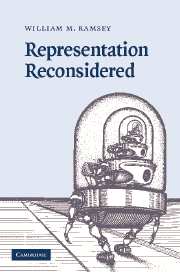Book contents
- Frontmatter
- Contents
- List of figures
- Preface
- 1 Demands on a representational theory
- 2 Representation in classical computational theories: the Standard Interpretation and its problems
- 3 Two notions of representation in the classical computational framework
- 4 The receptor notion and its problems
- 5 Tacit representation and its problems
- 6 Where is the representational paradigm headed?
- References
- Index
6 - Where is the representational paradigm headed?
Published online by Cambridge University Press: 12 November 2009
- Frontmatter
- Contents
- List of figures
- Preface
- 1 Demands on a representational theory
- 2 Representation in classical computational theories: the Standard Interpretation and its problems
- 3 Two notions of representation in the classical computational framework
- 4 The receptor notion and its problems
- 5 Tacit representation and its problems
- 6 Where is the representational paradigm headed?
- References
- Index
Summary
In this chapter, I want to do three things. First, in the next section, I want to make another pass at showing that when we think carefully about what it means for something to function as a representation in a cognitive system, we find that some notions measure up and others clearly do not. This time my analysis will be from a different angle. Instead of looking at representational notions as they are employed in different cognitive theories, I want to offer a more direct comparison between different types of representation that are functioning inside of the same simple system. My hope is that this will make clearer just how and why certain notions belong in scientific theories while the others do not. Second, while cognitive science is best described as having embraced a representational paradigm, there is a line of research that is moving in a different direction and that has generated considerable controversy. Dynamical systems theory is alleged to offer a framework for understanding cognitive processes that differs greatly from both the classical computational tradition and connectionism. One of the key differences emphasized by many dynamicists is their rejection of representation as an explanatory posit. This claim, in turn, has generated a wave of pro-representational advocacy. In section 6.2, I will look at how these debates bear on my own account and challenge some of the ways representationalism has been defended by its proponents.
- Type
- Chapter
- Information
- Representation Reconsidered , pp. 188 - 235Publisher: Cambridge University PressPrint publication year: 2007

